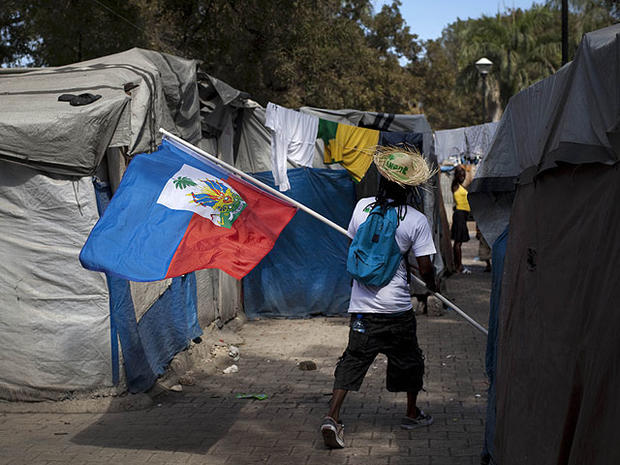Haiti still rebuilding after deadly '10 quake
Two years ago Thursday, Haiti was pummeled by a Magnitude 7 earthquake in which some 316,000 people died. Many more lost their homes. Since then, there has been some progress in rebuilding. CBS News medical correspondent Dr. Jon LaPook went back to Haiti to find out why more hasn't been done.
Thirty-five-year-old Gilna Pierre is cooking the only meal of the day for her family and neighbors. It's 90 degrees and her coal stove on a stone ledge is surrounded by tattered tents in the area called Katalpa, just outside Port-au-Prince. Two years after Haiti's earthquake, her family is among 500,000 other Haitians still without permanent homes.
"What is the government doing for you?" LaPook asked her.
"They don't do anything," she said.
LaPook then spoke with Haitian Prime Minister Garry Conille. "The Haitians are a very patient people. Are you worried that that patience might run out?"
"Every single day," said Conille.
Prime Minister Conille has been in office for three months. This American-educated doctor knows he's got a tough road ahead.
Three billion dollars had been donated to Haiti to rebuild. According to the United Nations, the Haitian government got only 18 percent of that money. Much of the balance went to the nearly 20,000 charities the prime minister estimates are operating in the country. So why does the nation look so broken?
Haiti: 2 years later, where's the money?
Ordeal for Haiti quake orphans endures
Special section: Haiti: The road to recovery
"The international community showed an incredible amount of generosity towards Haiti," he said. "Unfortunately, the systems weren't in place to make sure that the funding is channeled in an effective way."
Conille said charities helped in the short-term but have not collaborated with the government for long-term solutions. For example, one charity built a school but there were no teachers to fill it. Conille is considering a radical approach: making some charities leave.
"Can you envision throwing some of them out and saying, 'You know what? If you're not working with us, you're out of here,'" LaPook asked Conille.
"Yes, absolutely," he responded. "In fact I think we should be able to say very strongly that you're gonna play by certain rules or not play at all."
Tough language from a government previously known for corruption. But Conille says if nothing changes, neither will Haiti's desperate situation.
LaPook asked some women in a camp: "How many people here go to bed hungry?" Every hand went up.
Then LaPook asked them: "How long can you continue to live here like this?" One woman responded: "Only God knows."
Conille was asked by LaPook:" When you walk down the streets and you look into the eyes of the Haitian people, what do you see and what are they saying to you?"
"A combination of anxiety and hope," he said. "The country feeds on hope. And this is extraordinary. They really believe that tomorrow will be better. "
But for mothers like Gilna Pierre, there's a world of difference between belief and reality.

